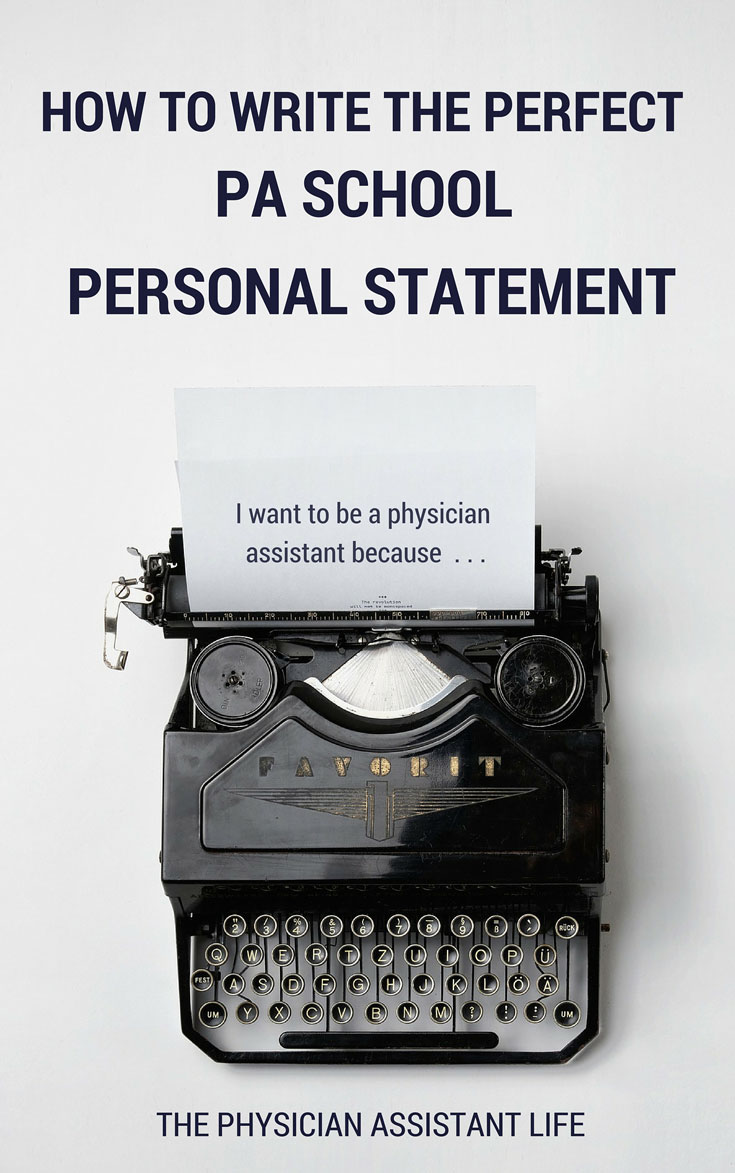 What makes the perfect PA school candidate?
What makes the perfect PA school candidate?
Someone with stellar grades from a top university, loads of patient care experience, countless shadowing hours, and a long list of community service endeavors, right?
Oh, and Ms. Perfect Candidate probably also speaks four languages fluently, has had her research findings published in peer-reviewed journals, and travels abroad each year to provide medical relief for those in need.
Needless to say, most candidates are far from perfect.
So how do you, a person who has experienced a few bumps in the road, position yourself as a competitive applicant?
How do you explain that your low undergraduate GPA doesn’t represent the person you are or the person you know you can become?
Your personal statement is a great place to address any shortcomings or weak points in your application. After all, you have 5,000 whole characters to let your personality and experiences shine.
Here are seven tips to successfully addressing your personal shortcomings in your personal statement:
1. Take Responsibility

There is nothing worse than dealing with someone who blames everyone else for everything. Think your co-worker who is late for nearly every shift and who always blames the traffic, her mother, and the employees at the Dunkin Donuts where she stops every morning to get coffee. In your personal statement, you definitely do not want to come across like this person.
Does this mean that when addressing shortcomings you must explicitly write, “I, So-and-So, take full and absolute responsibility for all of my actions, past and present…”? No, not necessarily.
Responsibility (or lack thereof) can be implied within our language choices. Active, direct language puts our subject front and center and conveys accountability.
Compare these two examples:
- “Due to being very busy with extracurricular activities my freshman year, studying did not happen as often as it should have. As a result, low grades occurred.”
- “I overcommitted myself to extracurricular activities my freshman year. I subsequently struggled with time management, and this affected my grades.”
The first example is skirting the issue and we’re missing a subject/actor (Who was busy with these activities? Who did not study enough? Who earned low grades?).
The second sentence is much more direct and gives the reader (the admissions committee) the sense that this person (the candidate) has no problem owning up to their mistakes.
2. Do Not Give Your Shortcomings the Spotlight
You don’t want to start your essay by discussing the worst part of your application.
Show how great you are first, and then, near the end of the essay, bring up the grades. Quickly recover with a powerful conclusion that reasserts your skills, talent, experience, and passion for the profession.
3. Take A “Lessons Learned” Approach
PAs are lifelong learners, and if you are an aspiring PA, you should be doing everything you can now to learn from your missteps.
When you’ve got a weak point in your application, it’s great to briefly discuss what you learned or gained from this challenge.
For instance, if you got rejected in last year’s application cycle, maybe you realized you weren’t quite ready for PA school and that you needed more patient care experience before you could be a competitive applicant. Maybe you learned resilience, to try and try again. To come back swinging. Remember, if we don’t learn from our mistakes, we’re not growing.
4. Do Not “Drop and Run”
If you’re going to mention a failed Biology class in your essay, you need to follow up with either an improvement (perhaps you retook the class and made an A the second time around) or a lesson learned (maybe you only got a C the second time around, but you learned how to ask for help from your peers or how to study more effectively).
5. Employ the Garbage Sandwich

Always try to stick the not-so-nice information (missteps, weak points, obstacles) between more pleasant pieces of information.
Imagine it like you’re making a sandwich with some funky-smelling meat and two really nice slices of bread. This technique softens the blow—the reader focuses more on the delicious, buttery bread and less on what’s actually inside the sandwich.
Here’s an example:
“Although I am extremely dedicated to providing high quality patient care now, I did not have this same drive to succeed during my first two years of college. I struggled with managing my time and finding study methods that worked for me, and my grades suffered as a result. However, I sought help from an academic advisor on campus and re-committed myself to my education. My grades improved drastically in my final two years, and I earned a 4.0 in my post-baccalaureate classes. These more recent grades are more indicative of the type of student I am, and show my commitment to pursuing the PA profession.”
How to employ the garbage sandwich:
- Start this paragraph with a positive (reminding the reader of the candidate’s dedication to the PA profession).
- Then, sneakily slip in the “bad stuff”…the low grades.
- Give reasons for the grades without making excuses, and discuss how the grades were improved.
- Finally, talk about the improved grades (with an amazing GPA as evidence).
The negative stuff, while addressed, is completely squashed between positives. This means the reader both enters and exits this paragraph on a positive note. They don’t walk away thinking about the nasty sandwich filling; the only aftertaste is that of the delicious bread.
6. Tread Lightly With Sensitive Topics

It’s fairly common for applicants (and for people in general) to have a sensitive issue in their past. Think divorce, drug use, alcoholism, eating disorders, mental illness.
And it’s understandable that these issues might affect grades. But before you mention them in a personal statement, it’s important to be aware of how these issues might reflect on you as a candidate.
If there are two candidates of equal experience and academic achievement, the admissions committee might opt to go with the one who hasn’t disclosed a history of mental illness, for example. It’s unfair, but it’s reality.
So before bringing up or detailing a sensitive issue in a personal statement, ask yourself: Is this issue directly tied to my desire to become a PA?
For instance, let’s say you are a recovering alcoholic. This affected your grades at times in college. But you went to rehab, you did the hard work, and now you’ve turned your life around. You’re sober. You’ve performed wonderfully in your prerequisite classes. Do you mention your drinking problem as the cause of your erratic undergraduate grades?
It depends.
If your entire reasoning for wanting to become a PA is tied up with your past and with the work you’ve done helping others recover, you might consider giving this experience some space in the essay. But be sure to discuss and emphasize other aspects of your life and work as well—you want to be more than just “the recovering alcoholic” because you most certainly are more than just “the recovering alcoholic.”
If, however, this was more of a blip in the road and it hasn’t had much effect on your professional life (like, maybe you are most passionate about working with dementia patients and you aren’t very involved with addiction recovery outside of your AA meetings), I’d advise not going into too much detail. In this case, it might be best to attribute your grades to “health issues” and to do your best in other parts of your essay and your application to compensate for your grades.
7. Do Not Dwell: Mention, And Move On
Remember: the best way to show the admissions committee that you’re more than just your grades is to show the admissions committee that you’re more than just your grades.
If you spend your entire personal statement discussing your low GPA, you’re not telling the story about the time you spent volunteering in Haiti. You’re not telling them why you want to be a PA and the kind of work you hope to do. You’re not discussing your experience as a medical assistant, or your experience losing your mother to cancer.
In short, you are robbing yourself the chance to show everyone what an amazing, capable, unique candidate you are.
Get in, and get out. Mention, and move on.
 Carly Hallman is a professional writer and editor and has helped hundreds of prospective PA school applicants through the PA School Essay Collaborative. Carly holds a B.A. in English Writing and Rhetoric (summa cum laude) from St. Edward’s University in Austin, Texas. She has worked as a curriculum developer, English teacher, and study abroad coordinator in Beijing, China, where she moved in 2011. In college, she was a Gilman Scholar and worked as a staff editor for her university’s academic journal. Her first novel, Year of the Goose, was published in 2015, and her first memoir is forthcoming from Little A books. Her essays and creative writing have appeared in The L.A. Review of Books, The Guardian, LitHub, and Identity Theory, among other publications.
Carly Hallman is a professional writer and editor and has helped hundreds of prospective PA school applicants through the PA School Essay Collaborative. Carly holds a B.A. in English Writing and Rhetoric (summa cum laude) from St. Edward’s University in Austin, Texas. She has worked as a curriculum developer, English teacher, and study abroad coordinator in Beijing, China, where she moved in 2011. In college, she was a Gilman Scholar and worked as a staff editor for her university’s academic journal. Her first novel, Year of the Goose, was published in 2015, and her first memoir is forthcoming from Little A books. Her essays and creative writing have appeared in The L.A. Review of Books, The Guardian, LitHub, and Identity Theory, among other publications.
The Physician Assistant Essay and Personal Statement Collaborative
Are you ready to get started? Choose your package, and we will begin today! Single Edit One-on-one service Supplemental Essays We have helped over 1,700 PA school applicants just like you (see testimonials and comments below). We are ready to help today. Our current PA school essay review service status: Accepting New Submissions (Photo: Me circa 1987 just thinking […]
How to Write the Perfect Physician Assistant School Application Essay
View all posts in this series
- How to Write the Perfect Physician Assistant School Application Essay
- The Physician Assistant Essay and Personal Statement Collaborative
- Do You Recognize These 7 Common Mistakes in Your Personal Statement?
- 7 Essays in 7 Days: PA Personal Statement Workshop: Essay 1, “A PA Changed My Life”
- PA Personal Statement Workshop: Essay 2, “I Want to Move Towards the Forefront of Patient Care”
- PA Personal Statement Workshop: Essay 3, “She Smiled, Said “Gracias!” and Gave me a Big Hug”
- PA Personal Statement Workshop: Essay 4, “I Have Gained so Much Experience by Working With Patients”
- PA Personal Statement Workshop: Essay 5, “Then Reach, my Son, and Lift Your People up With You”
- PA Personal Statement Workshop: Essay 6, “That First Day in Surgery was the First Day of the Rest of my Life”
- PA Personal Statement Workshop: Essay 7, “I Want to Take People From Dying to Living, I Want to Get Them Down From the Cliff.”
- Physician Assistant Personal Statement Workshop: “To say I was an accident-prone child is an understatement”
- 9 Simple Steps to Avoid Silly Spelling and Grammar Goofs in Your PA School Personel Statement
- 5 Tips to Get you Started on Your Personal Essay (and why you should do it now)
- How to Write Your Physician Assistant Personal Statement The Book!
- How to Write “Physician Assistant” The Definitive PA Grammar Guide
- 101 PA School Admissions Essays: The Book!
- 5 Things I’ve Learned Going Into My Fourth Physician Assistant Application Cycle
- 7 Tips for Addressing Shortcomings in Your PA School Personal Statement
- The #1 Mistake PRE-PAs Make on Their Personal Statement
- The Ultimate PA School Personal Statement Starter Kit
- The Ultimate Guide to CASPA Character and Space Limits
- 10 Questions Every PA School Personal Statement Must Answer
- 5 PA School Essays That Got These Pre-PAs Accepted Into PA School
- 7 Questions to Ask Yourself While Writing Your PA School Personal Statement
- 101 PA School Applicants Answer: What’s Your Greatest Strength?
- 12 Secrets to Writing an Irresistible PA School Personal Statement
- 7 Rules You Must Follow While Writing Your PA School Essay
- You Have 625 Words and 2.5 Minutes to Get Into PA School: Use Them Wisely
- What’s Your #1 Personal Statement Struggle?
- 31 (NEW) CASPA PA School Personal Statement Examples
- How to Prepare for Your PA School Interview Day Essay
- Should You Write Physician Associate or Physician Assistant on Your PA School Essay?
- Meet the World’s Sexiest PA School Applicants
- PA School Reapplicants: How to Rewrite Your PA School Essay for Guaranteed Success
- How to Write a Personal Statement Intro that Readers Want to Read
- PA School Reapplicant Personal Statement Checklist
- How to Deal with Bad News in Your Personal Statement
- Inside Out: How to use Pixar’s Rules of Storytelling to Improve your PA Personal Statement
- Ratatouille: A Pixar Recipe for PA School Personal Statement Success
- Personal Statement Panel Review (Replay)
- Mind Mapping: A Tool for Personal Statements, Supplemental Essays, and Interviews
- Start at the End: Advice for your PA School Personal Statement
















Leave a Reply